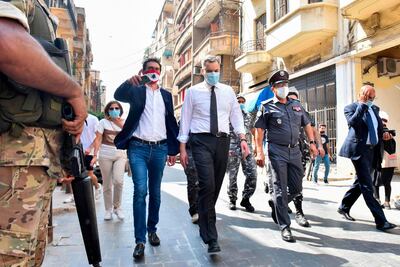Lebanese officials named a little-known diplomat as the country’s new prime minister as French President French Emmanuel Macron travelled to Beirut on Monday.
Mustapha Adib, 48, has been given the task of dragging Lebanon back from the cliff face and persuading Mr Macron to provide much-needed financial support to the bankrupt country.
The name featured prominently in Google searches over the past 48 hours, with even seasoned political watchers rushing to familiarise themselves with the new leader.
Many of those supported Mr Adib had not heard of him until hours before the parliamentary session where he secured 90 votes, easily beating his nearest rival, Nawaf Salam.
The idea of a no-name leader being entrusted with saving the crisis-ridden country did not inspire confidence among many Lebanese.
They have been calling for an overhaul of a political class widely blamed for crises including the August 4 port blast that ravaged half of Beirut.

"I don’t believe in anyone any more,” said Rony Abdel Massih, 33.
“The government will do whatever Hezbollah wants it to do. This new guy will start with good intentions then after a few weeks he’ll fall under the influence of the corrupt.
"This is a never-ending cycle in Lebanon and it won’t stop until you remove the religious and the fanatics from it.”
Until yesterday, Mr Adib served as Lebanon's ambassador to Germany and previously worked as an aide to a former prime minister, the billionaire Najib Miqati, who is from the same city in North Lebanon, Tripoli.
Mr Adib, who was a political appointment as ambassador, owes his career to powerful patrons.
Analysts say he would be reluctant to turn on them now even as Lebanon lurches from one catastrophe to the next.
Bahaa Hariri, the eldest son of assassinated former prime minister Rafik, often disagrees with the policies and decisions of another former premier, his brother Saad.
Bahaa tweeted his opinion of the new leader earlier in the day.
"Adib is another proxy for Lebanon's old system," he said. "It is not acceptable for warlords and militias to run our country."
Rana, 32, from Tripoli, says she would have preferred to see Mr Salam, an acclaimed judge and former representative to the UN, become prime minister.
“Maybe if he took the lead then we’d see a novel way of running the country," Rana said.
"He’s an independent but that’s why the “sulta” (political class) will never give him a chance.
"I genuinely believe this Mustapha is another Hassan Diab [his predecessor] in a different wig.
"He’s been selected by the same folk who have been robbing us blind for over 30 years.”
Mr Adib will have to steer through a crippling crisis fuelled by years of mismanagement and corruption by the same leaders who appointed him.
Despite this, he is charged with pushing through structural reforms to stop widespread graft and resume negotiations with the International Monetary Fund.
Mr Macron has also made it clear that France’s help relied on reforms that wind back the patronage networks that have run Lebanon since the end of the civil war in 1990, and from which all sects and their leaders have profited.
“Adib's appointment does not signal a new era in Lebanese politics but is merely a new face to a rotting regime and homework not well done by Macron,” said Daniella Daou, 23, a university graduate.
In his first televised speech, Mr Adib discussed “the difficult phase" that Lebanon is going through.
"After the destructive explosion that happened in the port that left many dead, injured and homeless, we do not have the time for promises or wishes," he said. "It is time to work."
Mr Adib's first act as prime minister-designate was to visit the site of the port blast, a gesture no other politician has made.
Lebanon’s other leaders were quick to deny responsibility for the devastating explosion that killed at least 190 people and injured 6,000.
